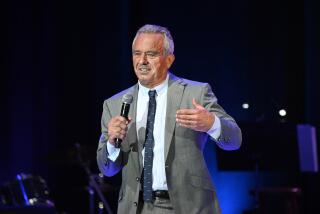Book review: ‘The Panic Virus’ by Seth Mnookin
The Panic Virus
A True Story of Medicine, Science, and Fear
Seth Mnookin
Simon & Schuster: 429 pp., $26.99
Readers take note. If you’re already convinced that vaccines cause autism, that vaccine-preventable infectious diseases no longer threaten children’s lives here and abroad, and that certain modern, anti-vaccine gurus are motivated by nothing but tender concern for your family’s health, Seth Mnookin’s “The Panic Virus” is not the book for you.
If, on the other hand, you want to learn how a “perfect storm” of angst, deception and reckless media fanfare led to years of backlash against childhood vaccines, step right up. It’s apt that “The Panic Virus” opens with the quote: “A lie will go round the world while truth is pulling its boots on.” The person who said this, 19th century preacher Charles Haddon Spurgeon, did not hesitate to rail against the “truthiness” of our age. Nor does Mnookin, a contributing editor at Vanity Fair whose books include “Hard News,” about the New York Times and its scandals.
Mnookin describes the case of Dr. Andrew Wakefield, the leading proponent of the theory that measles-mumps-rubella vaccine triggers autism, who lost his medical license in May 2010 after a British tribunal found his original research “dishonest and irresponsible.” (Last month the British Medical Journal characterized Wakefield’s work as an “elaborate fraud” riddled with falsified data and financial self-interest.)
Sadly, even if Wakefield ends up in court, the vast sums of money and energy that he and his sympathizers diverted from legitimate studies of autism can never be recovered. Nor can the lives and health of innocent youngsters who suffered illnesses that simple jabs would have prevented—if their parents hadn’t been scared to allow them.
Mnookin’s book begins, appropriately, with a long look at the history of vaccine-making and -giving, warts and all. Yes, it took courage to develop and receive early prototypes targeting smallpox and polio, among other plagues, and injuries and tragedies occurred along the way. Vaccines have also improved over time. But, despite what opponents of vaccines allege, an unholy alliance with Big Pharma is not the reason why physicians recommend vaccines to patients and family members and take them themselves.
The reason, as Mnookin shows, is because people need them. Despite measles’ decline over the last decade, for example, the world’s most contagious respiratory virus continues to circle the globe, often arriving in underimmunized communities via jet-setting offspring of vaccine-averse families. The long-hoped-for global eradication of polio now appears an elusive goal. Last year, California’s worst epidemic of whooping cough in 50 years claimed 10 babies’ lives.
In developing countries, one learns in “The Panic Virus,” new vaccines are a beacon of hope for millions of youngsters at risk of succumbing to meningitis, pneumonia and diarrhea, while childhood immunizations against hepatitis B and human papillomavirus are preventing future deaths from liver and cervical cancer. In light of growing global antibiotic resistance, vaccines directed against common bacterial killers as well as influenza (a frequent prelude to bacterial pneumonia) could become a vital lifeline for us all.
The braiding of well-researched scientific information with riveting takes on the people fueling recent vaccine wars is one of the book’s chief strengths. The latter group, as Mnookin details, includes a celebrity with a self-described degree from “the University of Google,” ratings-hungry talk show hosts and support group pundits holding forth in midnight chat rooms. Rounding out the cast are entrepreneurial MDs happy to ride the anti-vaccine wave while enjoying the “herd immunity” still protecting (for now, at least) the majority of their under-vaccinated patients.
One of the most important aspects of “The Panic Virus,” however, isn’t a person: It is the brash, sometimes blind self-confidence of our modern age. As Mnookin acutely observes: “The vernacular of 24-hour news channels and Internet search engines is freeing us to take on tasks that we’d long assumed were limited to those with specialized training.”
Of course, few parents eschew such medical expertise when ill-judged experiments go awry and children fall ill.
Ironically, over 25 years of infectious diseases practice, I have seen a number of young adults seeking vaccines that their parents once blocked. Someday, perhaps one of them will pen an account of life inside the maelstrom of anti-vaccine anger and fear. For now, however, “The Panic Virus” remains the definitive text.
Dunavan is a professor of medicine, infectious diseases and global health at UCLA.
More to Read
Sign up for our Book Club newsletter
Get the latest news, events and more from the Los Angeles Times Book Club, and help us get L.A. reading and talking.
You may occasionally receive promotional content from the Los Angeles Times.










